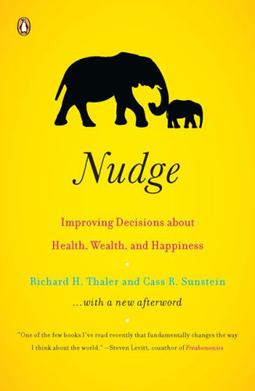Are you smarter than a squirrel?
What these cute critters can teach us, and why we’re nuts about ‘nudging’

Squirrels (and the acorns they collect) have long been used as a metaphor for savings. These industrious little critters store up the nuts when there’s plenty, ensuring they have an ample supply when winter comes. Of course, this behaviour isn’t about discipline and forward planning – if you’re a squirrel, it’s just pure instinct.
Us humans, on the other hand, deal with the double-edged sword of having greater brain capacity. It’s a defining characteristic of our species that we have the ability for abstract thought. This means we’re not driven purely by instinct, and can make deliberate choices about our behaviour… so why is it that we often make less smart decisions than the humble squirrel? We know we should plan better for the future, but we too often focus on the here-and-now.
The Science in a Nutshell
In basic terms, humans have two elements of their brain: the long-term, rational part, and the short-term, emotional part. These two are often in conflict. The degree of conflict varies between individuals, but short-term thinking results in impulsive behaviour, whilst long-term thinking leads to more disciplined behaviour.
When it comes to setting goals, we think ahead and use the rational part of our brain. We say things like:
“If I cut back on unnecessary spending, I could save X per week and go on a guilt-free holiday twice a year“.
But when it comes to daily life, we often use the emotional part of our brain.
“I said I wouldn’t spend money on takeaway, but dinner will only be $40… and I can’t be bothered cooking anyway.“.
The degree to which our ‘impulsive side’ wins affects how successful we are at reaching our long-term goals.
The field dedicated to understanding human behaviour is called ‘behavioural economics’. Where standard economics is based on an assumption of rationality, behavioural economics recognises that people are often irrational. It relies more on observation than anticipation. One of the more prominent research facilities in this arena is very cleverly called ‘The Centre for Advanced Hindsight’.
Nuts about ‘nudging’
Behavioural economists understand that you can help people align their short-term behaviour with their long-term goals by providing them with contextually-relevant little prompts. In other words, you remind people of what’s good for them at an appropriate time, and in an appropriate way. These little reminders are called ‘nudges’.
 There’s growing support for the idea of using nudges, from helping people improve their health to helping them manage their finances. In fact, the Nobel Prize for Economics was recently awarded to Richard Thaler for his work on behavioural economics – which includes his book, Nudge.
There’s growing support for the idea of using nudges, from helping people improve their health to helping them manage their finances. In fact, the Nobel Prize for Economics was recently awarded to Richard Thaler for his work on behavioural economics – which includes his book, Nudge.
And that’s where we come in
At Nudge Saver, we believe we can make a genuine difference to people’s lives by helping them align their long-term financial goals – whether a holiday or a house deposit – with their short-term tendency towards being impulsive. How, exactly?
Well, by directing their impulsive behaviour towards their long term goals. It starts with sending impulse savings prompts for small amounts (“Hey Chris, do you want to save $6 towards your NZ holiday?”). The part of the person’s brain that usually falls for impulse spending (because ‘it’s only a few dollars, so who cares?’) is now going to be used to get them to make a small top up towards their goal instead. Of course, there’s a lot more to Nudge Saver than that… and it’s all geared towards the same outcome of putting people back in control of their financial choices.
What are you waiting for? Jump in, and check it out!
